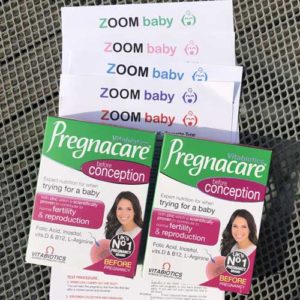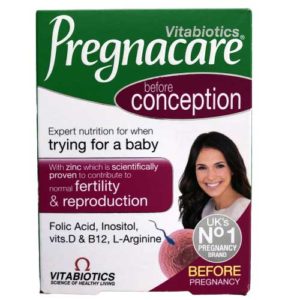A clinical trial suggests that women who are thinking about having a baby should take recommended supplements, as they will have an increased chance of becoming pregnant.
The Royal Free Hospital and University College London conducted a recent study using 58 women. In this study they focused on pregnancy rates when the women were given prenatal micronutrient supplements.
The study used a multivitamin called Pregnacare Conception that is made by Vitabiotics. The manufacturer, however, did not fund, influence, or commission the study in any way. The company simply provided the vitamins that are usually sold in packs of 30 for £10.99. The vitamins contain compounds such as vitamin B12, folic acid, and others.
The study’s data showed the women who took the vitamins were not only more likely to conceive, but 60% of them were still pregnant in their third month. On the other hand, this rate for women taking only folic acid was a mere 25%.

The clinical trial used women who were already receiving fertility enhancing treatments, but since no side effects were found while the vitamins were being used, scientists determined any woman trying to conceive a child should take them.
During the study, the women were broken into two groups. The first group was given only folic acid pills, which are the suggested supplement according to the government for preventing baby abnormalities. The second group of women was given a mineral tablet and multivitamin.
After four months of taking these pills daily, the women underwent fertility drug treatments. The results showed the women taking vitamins had a higher chance of conceiving, with 60% of the women still pregnant after three months. This is compared to only 25% in the women who simply took folic acid.
Moreover, these women were also more likely to become pregnant after less fertility treatments; here 3/4 of women were pregnant after the first cycle. On folic acid, the number of women pregnant after the first cycle would drop to one in five.
It is also important to note the women used in the study were mainly from affluent backgrounds, maintained healthy diets before the study began, and that later blood tests proved those taking the vitamins had much higher amounts of micronutrients than the women simply taking folic acid.
Dr Rina Agrawal, the lead author, explained that it is unknown exactly which components found in the multivitamin actually played the biggest role in pregnancy. This is due to the fact that Pregnacare Conception pills contain a wide array of minerals, substances, vitamins, and antioxidants known to enhance the blood flow to reproductive organs and ovarian function.
These finding were published in an online publication called the Reproductive BioMedicine Online journal.
Though this study’s results are quite interesting, more research is still needed. In fact, a larger group of women should be used to test if the results change when a more diversified group of women is used.
While the results are certainly intriguing, it’s wise to keep an open yet cautious mindset. After all, this was just one relatively small study. To truly validate these findings, we need larger-scale research involving hundreds or even thousands of women from diverse backgrounds. It’s like building a house – you want a solid foundation before constructing the rest. So view this as an exciting first step, but recognise more scientific ‘bricks’ are needed to give us full confidence in the supplement’s fertility benefits.
Wider Research Needed
While the initial results seem promising for women trying to conceive, it is important to note that this was a small study with only 58 participants. To truly validate the findings, the study should be replicated on a larger scale with hundreds or even thousands of women. A larger sample size would provide more statistical power and allow for analysis of subgroups based on factors like age, ethnicity, medical history, etc.
Additionally, the study only followed women for a short period of time – through their first cycle of fertility treatment. Longer-term tracking of conception, pregnancy, and birth rates would give a clearer picture of the supplement’s efficacy. Following participants for 6 or 12 months would better capture real-world outcomes.
The women in this study were relatively homogeneous, mostly coming from affluent backgrounds with healthy diets already. Testing a more diverse population could reveal differences in how subgroups respond to supplementation. Women with nutritional deficiencies, chronic illnesses, or fertility issues may see greater or lesser benefits.
It is also worth investigating the optimal dosage and formulation of vitamins and minerals for fertility. This study used one commercially available supplement, but others may be equally or more effective depending on the specific ingredients and amounts. Custom formulations tailored to an individual’s needs could potentially improve results.
More research is needed on the mechanisms by which these micronutrients impact fertility at the cellular level. Pinpointing the biological pathways involved could help refine supplementation approaches. Safety studies should also be conducted looking for any potential long-term risks of taking higher doses of vitamins and minerals.
Finally, studies could explore whether male partners also benefit from similar supplementation. The fertility space tends to focus on women, but men’s health also influences conception rates. Optimising nutrients in both partners could potentially amplify the positive effects.
While promising, these initial findings require robust follow-up research before firm conclusions can be drawn. Carefully designed studies addressing limitations of the original trial will add nuance and give a more definitive answer regarding prenatal supplements and fertility. Responsible science communication is important so people understand these kinds of preliminary results.
Our Recommended Product
We highly recommend Pregnacare Conception tablets for women who are trying to conceive. Each pack contains 30 tablets – enough for a full month’s supply. At £10.99, it offers great value for such a comprehensive fertility supplement.
What makes this product stand out is its complete mix of vital nutrients. You’ll get the recommended 400mcg of folic acid, plus vitamin B12 and other key minerals that can boost your chances of getting pregnant. The research shows promising results – women taking these supplements were more likely to conceive and stay pregnant compared to those taking just folic acid.
The tablets are easy to take – just one a day with your main meal. They’re suitable for vegetarians and free from artificial colours and preservatives. For best results, start taking them 3-6 months before trying for a baby. This helps build up your nutrient stores for a healthy pregnancy.
Remember to pair these with a healthy diet and lifestyle for the best chance of conception.
Photo by Anthony Cunningham for Zoom Baby
Zoom Baby is a leading supplier of Pregnancy Tests and Ovulation Test Kits
This post was originally published in 2015. It was last updated in January 2025.






